With a bit of sleuthing, shipping data can uncover your competitors’ suppliers and trade routes — and help you win more market share
What you’ll learn in this guide:
- Create a market overview for any product or industry segment using verified shipping data, including top players by market share.
- Triage shipping data to assess competitors by total shipments, gross weight, delivery schedules, and more.
- Uncover competitors’ customer relationships down to bill-of-lading detail.
⏱️ Time required: 2 hours to assess your market and competitors
🎯 Best for: Business founders and leaders, C-suite executives directing business strategy and developing international supplier relationships
Uncovering the secrets to global trade success
Do you really know who your competitors are working with — and how often? Most companies don’t. But you can.
When a company flounders, it’s often because its sense of the market has gone stale, allowing competitors to gain an edge. According to data from the Bureau of Labour Statistics, declining competitiveness leads nearly 50% of US businesses to close within 5 years, and 65% to board up within a decade.
“Declining competitiveness is a common affliction for many businesses, and there’s a simple antidote,” says ImportGenius CEO Michael Kanko. “Business leaders need a steady stream of timely information that provides insight into where their market is headed and what their competitors are doing to adjust.”
The place to find that insight is in the ground-level data of port landings, shipping manifests, bills of lading, and TEU volumes — precisely the data that ImportGenius provides. “Many companies are surprised to learn that their shipments to U.S. seaports are publicly available,” says Kanko. “But it’s not just their shipments that are public, it’s their competitors’ shipments too.”
[CTA]
The steps below show exactly how companies can assess their market and keep tabs on their competitors using the hypothetical example of a manufacturer and importer of olive oil — a ubiquitous product in a highly competitive market.
Step 1: Assess sector imports by country of origin
The Challenge: Reach beyond macroeconomic indicators to understand how your specific product and market are faring in the broader economy.
The Solution: ImportGenius provides an instant, reliable snapshot of import shipments for an entire industry, allowing businesses to confirm their assumptions and adjust their approach.
The first step is to test and validate your current assumptions about your own market. That will allow you to be more strategic about any decisions about launching new products or entering new regions.
ImportGenius’ Lighthouse data service, accessible from the main search page, provides quick visual summaries of US import trade data by volume, product, country of origin and more. Lighthouse allows users to isolate trade data for precise products, inputs or components to gain a sense of their specific market.
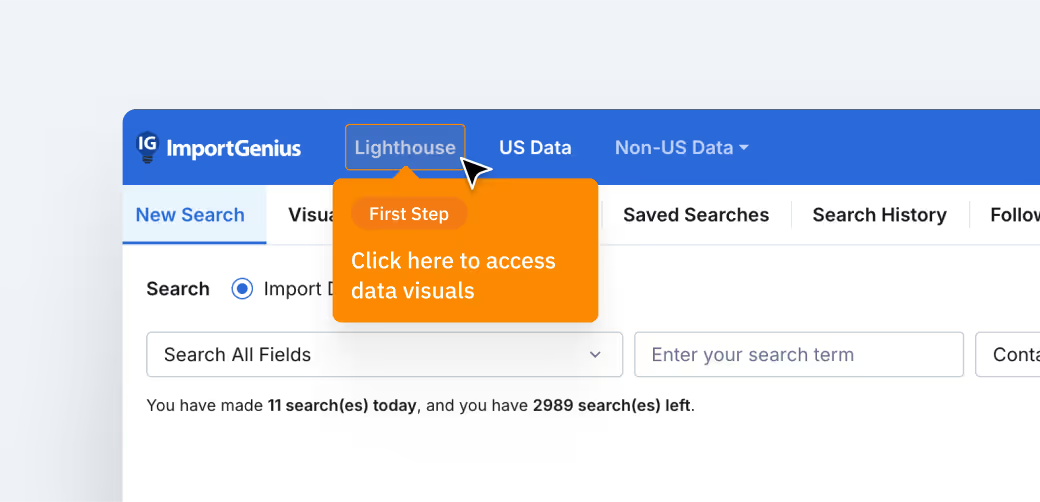
In our hypothetical example, a search for all kinds of olive oil specified in shipping manifests — the options will autogenerate as the user inputs their query — quickly generates results for 89,000 olive oil shipments since January of 2022.
The data, triaged by gross weight, shows a stable market for olive oil imports, down slightly from its 2022 high of more than 712 million kilograms.
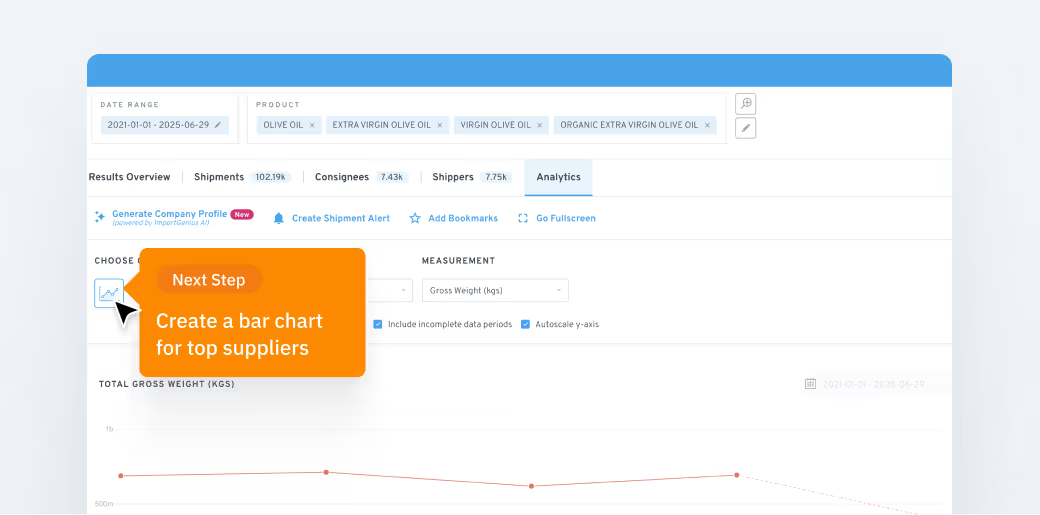
Companies in this kind of mature market will have to fight hard for any additional market share. The next step is to dig deeper into the data to find out which specific suppliers are shipping the most volume.
Step 2: Identify and assess your competition
The Challenge: Gaining new insight into competitor behaviour that reaches beyond basic web searches.
The Solution: Use ImportGenius to reveal your competition’s shipping volumes, customers, suppliers, and activity patterns.
By breaking down this overall data by supplier, the user can see which companies have the largest share of the U.S. import market for olive oil. The data paints a complete, reliable picture of the competition for this industry, just as it can for any other. This lets executives identify fast-growing challengers and benchmark performance.
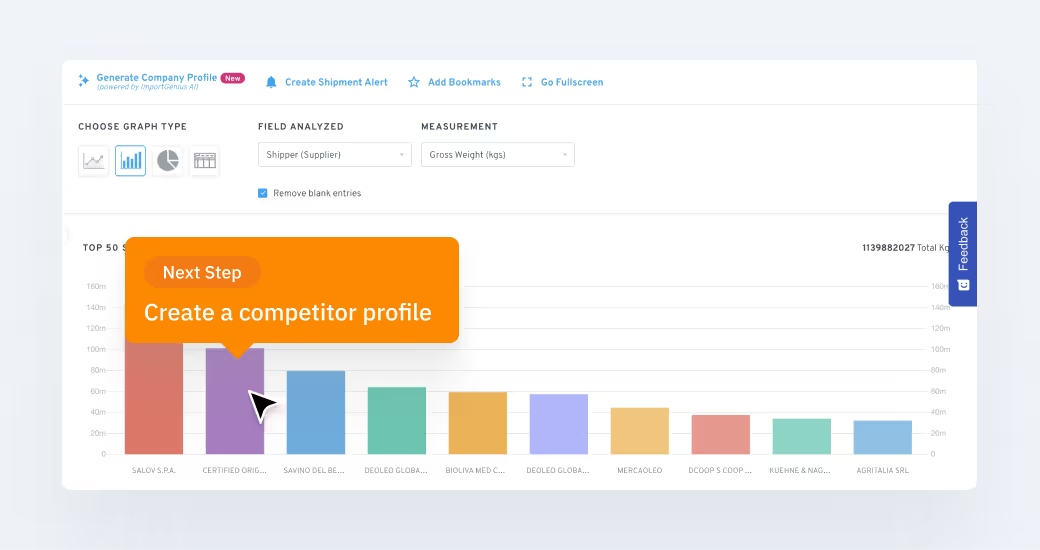
This is where the strategic value of the data begins to emerge. This kind of data provides a clear comparison of where a business stands in relation to competitors. It can also identify potential acquisition targets, underserved market segments, and other pathways to business growth.
Step 3: Get AI-driven, in-depth competitor insight
The Challenge: Get objective verification beyond company websites, marketing materials and sales presentations.
The Solution: ImportGenius provides manifest-level shipping history, port usage patterns, and customer and operational detail — intelligence that’s impossible to fabricate or manipulate.
Clicking on any individual supplier’s name will generate an AI-powered company profile that includes core products, financial data, the U.S. ports it routinely ships to, and more. It can also identify a company’s largest customers — even when those companies have taken pains to conceal that information.
The ImportGenius Company Profile for Certified Origins, an Italy-based firm that is the second-leading importer of olive oil by total weight, shows that the company ships substantial volumes to multiple ports on all U.S. coasts. It also shows that nearly all its shipments are destined for a single importer: itself. Certified Origins Italia has an American subsidiary that receives all its shipments.
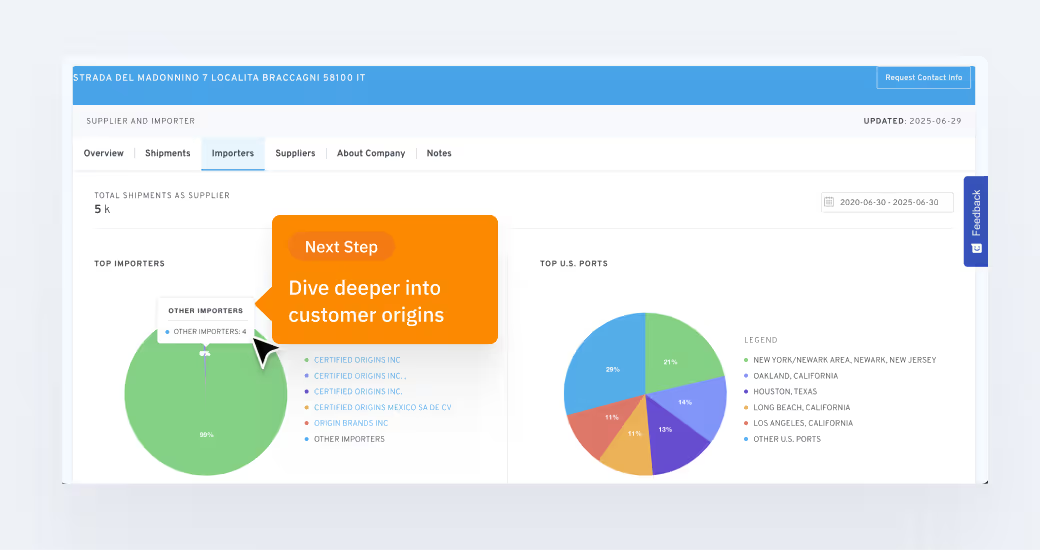
Notice, however, that according to the Company Profile data, Certified Origins Italia has had a small number of other customers. The next step is to find out who those customers are.
Step 4: Dive deeper into the data to unearth competitor relationships
The Challenge: Unearth competitor relationships with customers to plan your business strategy going forward.
The Solution: Use ImportGenius’ data tools to obtain a comprehensive list of competitors’ importers, with data that includes total and individual shipments, product volumes, and shipment schedules.
For this next step, we need to exit the Lighthouse data visualizer and return to the ImportGenius main search page, and conduct a new search for shipments from Certified Origins Italia, this time going back as far as 20 years. The search generates more than 14,000 individual shipment records from the company, including the product, shipment date, ports of departure and arrival, gross weight and bill of lading number.
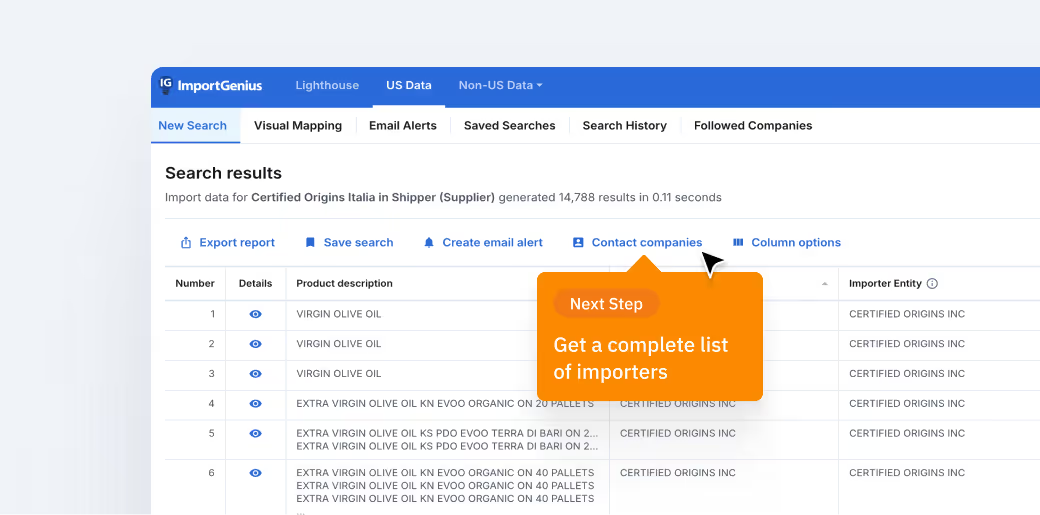
Searching for this company’s importers other than its own subsidiary, amid 14,000 individual records, would be a time-consuming task – but ImportGenius’ database does it in seconds. By clicking on the Contact companies link, ImportGenius filters through the records to remove duplicate entries and provide the name of all Certified Origins’ importers. That’s where the company’s hidden customers are revealed:
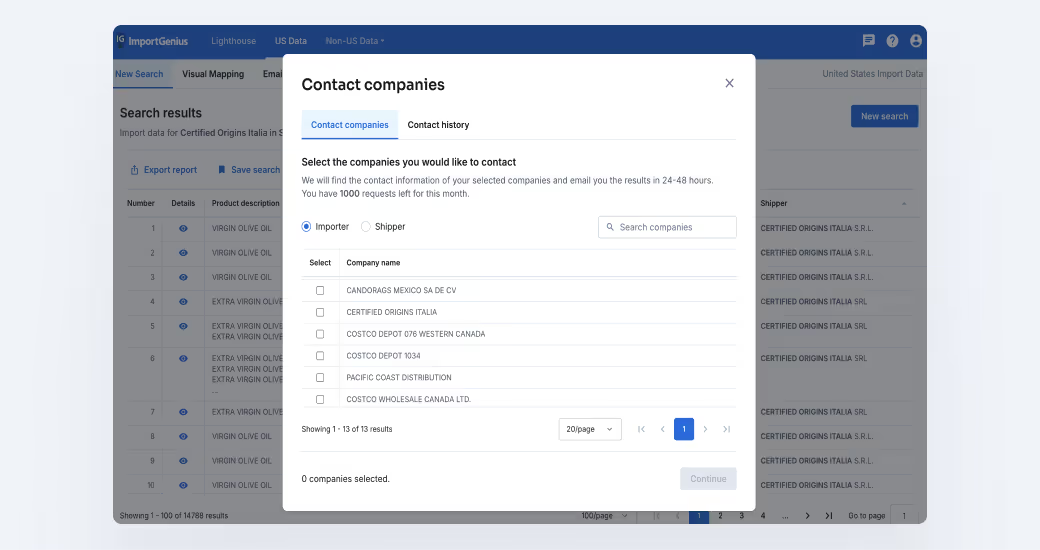
Those customers include large nationwide retailers as well as regional distributors. With these customer identities now in hand, ImportGenius users can search further to discover each customer’s shipment volumes, delivery dates, preferred ports, and other suppliers.
All this information is strategically essential. Knowing exactly who your rivals are selling to opens the door for competitive outreach, the development of new, targeted partnerships, and inroads into new market segments.
Final Step: Repeat the process and plan for future growth
This same search can be repeated for every major and minor player in any product or market segment. The information generated by the searches can help business leaders get a clear-eyed view of their own company’s fitness, as well as their competitors’. They can use it to target new customers, find new partners, or assess potential acquisitions. Your competitors might already be analyzing your supply chain. The question is—how well do you know theirs?
“If companies aren’t already working with this kind of data to plan their business strategy, they’re behind the market,” says Kanko. “And because the data is updated daily, it’s an ongoing and evergreen source of critical insight for any company.”
Ready to see how this works?

Ready to see how this works?



More blogs & reports





